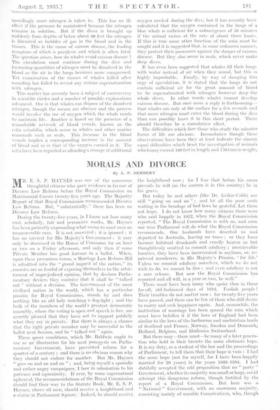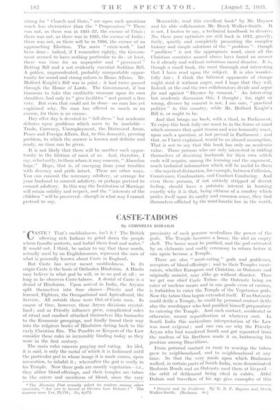MORALS AND DIVORCE
By A. P. HERBERT
MR. E. S. P. HAYNES was one of the numerous thoughtful citizens who gave evidence in favour of Divorce. Law Reform before the Royal Commission on Matrimonial Causes twenty-five years ago. The Majority Report of that Royal Commission recommended Divorce Law Reform. But, " substantially," there has been no Divorce Law Reform.
During the twenty-five years, in I know not how many cool, scholarly, fair and persuasive works, Mr. Haynes has been patiently expounding what seems to most men an unanswerable case. It is not answered : it is ignored : it has no interest for His Majesty's Government : it may only be discussed in the House of Commons for an hour or two on a Friday afternoon, and only then if some Private Member has good fortune in a ballot. When, upon these precarious terms, a Marriage Law Reform Bill is admitted into the " grand inquest of the nation," its enemies are so fearful of exposing themselves to the arbit- rament of unprejudiced opinion, that by devious Parlia- mentary devices they contrive that it shall be " talked out " without as division. The Government of the most civilized .nation in the world, which has a particular passion for Royal Commissions, • stands by and • does nothing, like an old lady watching a dog-fight ; and the bulk of the members of the world's greatest democratic assembly, where the voting -is -open and speech is free, are secretly pleased that they have not to' support publicly What they say in private. ' But there' is always a chance that the right private member may be successful in the ballot next Session, and -be " talked out " again.
These queer conditions, which • Mr. Baldwin ought to use as 'an-illustration for his next panegyric on Parlia- mentary Government, • and • prevented reform for a quarter of a century ; and .there is -no obvious reason why they should not endure for another. But Mr. Haynes " goes on and on and on •" ; and, being myself a sporadic and rather angry campaigner; I bow. in admiration to his patience and equanimity. If ever;- by some supernatural upheaval, the recommendations of the Royal Commission should find'-their Way to the .Statute Book, Mr. E. S. P. Haynes,• above- all men, should receive a knighthood and a•statue• in Parliament Square:. Indeed, he should receive the knighthood now ; for I fear that before -his cause prevails he will (as the custom is in this country) be in his grave.
But today he and others (like Dr. Geikie-Cobb) are still " going on and on " ; and let all the poor souls waiting in the bondage of bad laws be grateful. Let them not hope. I do not know how many citizens there were who said happily in 1912, when the Royal Commission reported, " The Royal Commission is with us, and soon our wise Parliament will do what the Royal Commission recommends. Our husbands have deserted us • and departed to Australia, leaving no trace : or they have become habitual drunkards -.and cruelly beaten us but thoughtlessly omitted to commit adultery ; irretrievable lunatics, they have been incarcerated in asylums, or, re- prieved murderers, in His Majesty's Prisons, for life.' Unless we commit adultery ourselves, which we do not wish to do, we cannot be free : and even adultery is • not a sure release. But now the Royal • Commission has reported and all will, in a year or two, be well."
There must have been many who spoke thus in those far-off, old-fashioned days of 1912. Foolish people ! Their troubles do not matter now : for twenty-five years have passed, and there can be few of them who still desire to marry and seek happiness again. And, meanwhile, the institution of marriage has been spared the ruin which must have befallen it if the laws of England had been similar to the laws of the barbarous and unchristian lands of Scotland and France, Norway, Sweden and Denmark, Holland, Belgium, and libidinous Switzerland. • But there may—there must—be many of a later genera- tion 'who hold in their breaSts the same obstinate hope. It is my duty, as a student of the law and the proceedings of Parliament, to tell them that their hope is vain. :- I had the same hope (not for myself, for I have been happily married for 20 years) in the years 1933-1934. I had dutifully accepted the odd proposition that no " party " Government, whether its majority was small or large, could attempt this dangerous reform, though fortified by the report of a Royal Commission. But here was • a " National " Government, with an enormous majority, consisting mainly of sensible • Conservatives, • who, though ,strong for " Church and State," are upon such questions much less obstructive than the " Progressives."* There was not, as there was in 1931-32, the excuse of Crisis ; there was not, as there was in 1935, the excuse of India ; there was not, as there will be in 1936, the excuse of an approaching Election. The main " crisis-work " had been done : indeed, if I remember rightly, the Govern- ment seemed to have, nothing particular to. do—at least, there was time for an unpopular and " piecemeal " Betting Bill and a not evidently essential ,Sedition Bill. A golden,. unprecedented, probably unrepeatable oppor- tunity for sound and strong reform in Home Affairs. Mr. Holford Knight's Bill was in-print : it had twice passed through, the House of Lords. The Government, if too timorous to take this creditable measure upon its own shoulders, had only to " give facilities " and permit -a free vote. But even that could not be done—no man has yet explained why. iNo man has offered ,so much as an excuse, for there is no excuse.
Day after, day is devoted to " full-dress " but academic debates upon problems . which seem to be insoluble-- Trade, Currency, Unemployment, the. Distressed Areas, Peace and Foreign Affairs. But, to this domestic, pressing problem, to which the answer is known and definite and ready, no time can be given.
. ..It is not likely that there. will be. another such oppor, tunity in the lifetime of most of us. And, therefore, I say, reluctantly, to those whom it may concern, " Abandon hope." Hope, that is, of emerging from - your troubles with decency and pride intact. There are other ways. You can commit the necessary adultery, or arrange for your husband to commit adultery, or perhaps pretend to commit adultery. In this way the Institution of Marriage will retain solidity and respect, and the " interests of the children " will be preserved—though in what way I cannot pretend to say. • Meanwhile, read this excellent book* by Mr. Haynes and his able collaborator, Mr. Derek Walker-Smith. It is. not, I hasten to say, a technical handbook to -divorce. No, these poor optimists are still back in 1912, gravely, fairly, quietly and completely presenting the complex history and simple solutions of the " problem "—though " problem is not . the appropriate word, since all the Christian countries named above have found an answer to it already and without notorious moral disaster. It is though a small book, the most thorough and interesting that I have read upon the subject.' It is also wonder- fully fair : I think the bitterest opponents of change. might read it without anger, and I hope that they will. Indeed, at the end the two collaborators divide and argue for and against ".DivcA7ce by consent." An interesting but academic discussion this, I thought ; for, right• or wrong, divorce by consent is not, I am sure, " practical polities " in this country; while Mr. Holford Knight's Bill is or ought to be.
And that brings me back, with a thud, to Parliament. To enjoy this book fully one must be in the frame of mind which assumes that quiet reason and wise'humanity must, upon such a question; at last prevail in Parliament : and that, as I have explained, would he an absurd assumption. That is not to "say 'that this book has only an academic value. Those persons who are only interested in ridding themselves of deserting husbands for their own selfish ends will acquire, among the learning and the arguinent, much technical information which will be useful to them —the mystical distinction, for example, between Collusion, Connivance, Condonation, and Conduct Conducing. And even these personS, if not entirely stripped of decent feeling, should have a patriotic interest in learning exactly why it is that; being citizens of a courttry which prides itself upon its sanity and common sense, they find themselves afflicted by the most lunatic law in the World.'







































 Previous page
Previous page